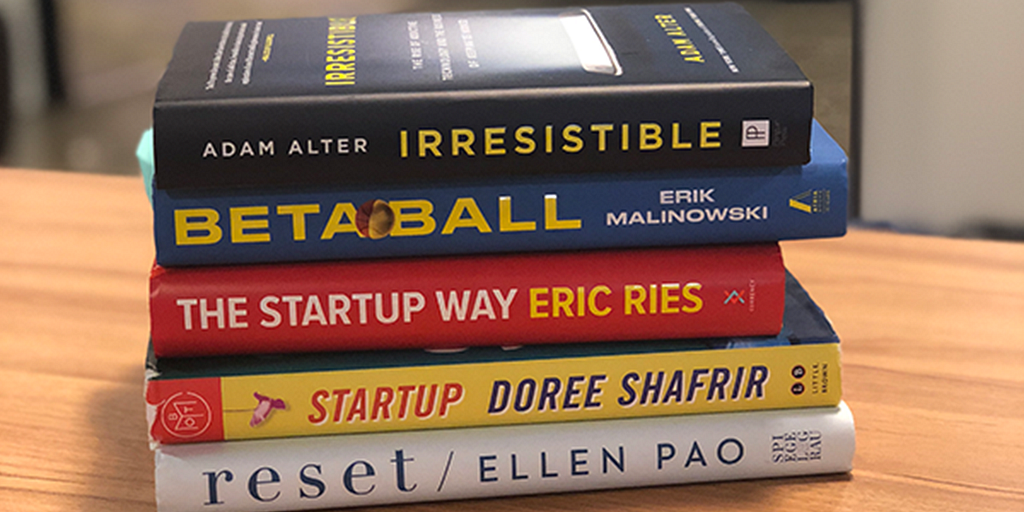Necessary reads on the past, present, and future of the tech industry.

In a society that is rapidly shifting, it is no surprise to see tech at the epicenter. Larger conversations from the effect of technology on our daily lives to gender discrimination and harassment in the workplace have dominated the conversation in the past year and created necessary dialogue on the problems plaguing the tech industry. However as Silicon Valley’s innovative culture continues to grow and influence, tech is also shifting in exciting ways. We’ve compiled a list of books that we believe are must-reads for people who work in the tech industry or simply have a stake in where tech was, where it is, and where it’s going.
Reset by Ellen Pao
Though the world of venture capital and Sand Hill Road is foreign to many, the story of Ellen K. Pao, could be — stripped of the minutiae — plausibly that of any woman in any industry. In a time when multiple industries are publicly calling for an end to sexual harassment and gender discrimination in the workplace, Reset: My Fight for Inclusion and Everlasting Change, goes in depth into Pao’s career experiences with leaning in, asserting her place in the workforce, and being met with exclusion, sexism, and intimidation, particularly at Kleiner Perkins Caufield & Byers, the venture capital firm in which Pao was junior partner and Chief of Staff to managing partner John Doerr from 2005 to 2011.
For those in the tech industry, which has recently had its fair share of news-making headlines in regards to harassment, discrimination and otherwise, this book hits hard.With this book, Pao asks the tech industry as a whole to take a closer look in the mirror, fully understand what is wrong and — hopefully — reset and move forward in a way that is safe and equitable for all.
— Liz Huang
Beta Ball by Erik Malinowski
In April of 2017, the Golden State Warriors became the basketball team with the most wins over a three year period, surpassing the prime of Michael Jordan’s Chicago Bulls. This dominance and rise to glory didn’t happen by luck. Betaball by Erik Malinowski chronicles the current era of the Warriors, starting with the purchase by Joe Lacob and Peter Gruber in 2010. Lacob’s experience as an executive and venture capitalist in Silicon Valley influenced many aspects of the team’s new approach, from making the office layout itself more collaborative by ripping out cubicles, to a wholehearted embrace of experimentation, including partnering with SportVU to employ cutting-edge data collection.
Similar to Michael Lewis’ Moneyball, the book transcends sports and becomes about a passionate characters trying to change a culture. Learn how the team worked to create one of the most fluid and flexible basketball systems, and embraced feedback from all corners of the organization. Ultimately, Betaball is a story about building an empowered team and how to push towards greatness, together.
— Mischa von Nachtigal
Troublemakers by Leslie Berlin
Silicon Valley did not start in a garage in Los Altos in 1976 or in a Harvard dorm room in 2004. It wasn’t created single-handedly by Steve Jobs or Larry Page and wasn’t the result of a perfect storm of conditions. Rather, Silicon Valley came about because of the right people who laid the groundwork and possessed the vision and foresight to make it happen. In Troublemakers, author Leslie Berlin goes back to the beginning, to the formative years of the Valley that shaped it to what it is today.
Silicon Valley, mythologized and revered, has a long, and lengthy history that distills itself in such a way that the general public — as well as those who work in the industry — know little of its humble start. Names such as Mike Markkula, first chairman of Apple, and Sandra Kurtzig, the first woman to take a tech company public — among others — hold no significance to most but were instrumental to the formation of tech as we know it. In the book, Berlin pays an homage to the people who challenged the status quo, dreamt beyond themselves, and came together to create five major industries in the span of 7 years and 35 miles.
— Liz Huang
The Startup Way by Eric Ries
Even though it’s a follow-up to the seminal business book, The Lean Startup, Eric Ries’ latest book The Startup Way stands on its own. While some might think a startup mentality (fail fast, experiment, continuous innovation) can only be achieved by teams of a certain size, The Startup Way is proof otherwise. Peppered throughout the book are stories and examples of how lean thinking exists or is embraced at older, established organizations like Citi, Intuit, GE, and more.
Ries reports from the intersection of traditional management and what he terms “entrepreneurial management,” and he aims to give organizations a map to envision what their transformational process should look like as they move to a leaner way of working. If you want to revolutionize how your large company operates, this is the book you (and your whole team) need to read.
— Mischa von Nachtigal
Irresistible by Adam Atler
The addictive nature of technology — the central topic explored in Irresistible by Adam Atler — sheds a dark light on the gadgets and screens that have become so ubiquitous in our day to day lives. The stats Atler lists are staggering; 40 percent of people have some sort of internet based compulsion, the average attention span is now 8 seconds, Americans spend on average 3 hours of every day on their smartphones — the list goes on and on. Technology is so addictive that tech founders actively prevent their children and other family members from usage of the products they peddle so readily to the public — detailed by Atler in a section aptly titled “Don’t Get High on Your Own Supply.”
Atler doesn’t advocate for eschewing technology completely, and believes that it has enough benefits to humans that its growth and flourishment should be considered a net-positive. However, he makes a moral proposition for those in power to create and engineer in a way that is conscientious of tech’s impact on people, mentally and otherwise.
— Liz Huang
Startup by Doree Shafrir
At first glance, Startup by Doree Shafrir seems like a parody of startup culture in the vein of HBO’s Silicon Valley. However, scratch below the surface and the story quickly becomes a moral questioning of participants and bystanders in a toxic culture.
If the book seems scarily accurate in its portrayal of startup tech culture, it’s because Shafrir has had a front row seat to new media and tech as both an early employee at Gawker, and then as a culture editor at Buzzfeed. The main premise of Startup is that a reporter uncovers a massive scandal involving a CEO and a young social media manager at his company. As everything unravels, Shafrir shines a light on the dangers of a male-dominated environment, and in particular, what happens when there’s a massive dearth in power between those who have it and those who do not. With Startup, Shafrir is advocating for the dismantling of sexism in the tech industry, and holds a mirror to the toxic culture that is oftentimes so willfully ignored.
— Liz Huang
WTF? What’s the Future and Why It’s Up to Us by Tim O’Reilly
They say history books are written by the victors, but WTF? What’s the Future and Why It’s Up to Us by Tim O'Reilly is more like a case of a philosophy book being written by one of our era’s foremost luminaries. O’Reilly hardly needs an introduction as one of the key figures who popularized the term and concept of open source software, and this book showcases how valuable his unique perspective can be when considering the future of today’s tech industry. While most tech-related headlines in the media talk about the latest unicorn company’s valuation or output, O’Reilly delves into what defines them — from the circumstances that helped fuel their growth, how they position themselves, to what consumer behaviors they’re looking to change or invent.
Throughout the book, O’Reilly keeps coming back to these central questions as a moral guide: “What will new technology let us do that was previously impossible? Will it help us build the kind of society we want to live in?” It would be easy for WTF? to portray a big dystopian nightmare proclaiming that machines will take our jobs and joy, but it is the last part of the book that happily avoids this cliché and instead takes us on a path towards hope. A path that discusses many choices those in tech have to face everyday — from more sustainable ways to build a business, to creating artificially intelligent systems that augment human competency rather than replace it. It’s a path that must be pursued to build a future that’s better than what we have now.
— Mischa von Nachtigal
What are some favorite recent books you’ve read that you think others who work in tech should read? Let us know by responding to this post.

Change is the only constant, so individuals, institutions, and businesses must be Built to Adapt. At Pivotal, we believe change should be expected, embraced, and incorporated continuously through development and innovation, because good software is never finished.

7 Recent Books That Everyone in Tech Should Read was originally published in Built to Adapt on Medium, where people are continuing the conversation by highlighting and responding to this story.























